I am running an Asus laptop in dual boot mode between Windows 10 Pro and Linux Mint 20.1. I am consistently getting much different results between the two when running the Benchmark in Mathematica 12.2.
Specs:
- Intel i7-8550U @ 1.80Ghz (4 cores, 8 threads)
- 16GB RAM
- NVIDIA GeForce GTX1050
- 256GB SATA M.2 SSD
- 2TB SATA mechanical HD @ 5400 RPM
In Windows, the OS and Mathematica both boot from the SSD while in Linux, the OS and Mathematica are both running off a partition on the mechanical hard drive. I would expect to see a performance boost in Windows just because of the storage differences, but the exact opposite has been true. I am also seeing a lot more variability in Windows versus Linux.
Here is one of my better Windows runs:
{"MachineName" -> "kickert-asus",
"System" -> "Microsoft Windows (64-bit)",
"BenchmarkName" -> "WolframMark", "FullVersionNumber" ->
"12.2.0", "Date" -> "January 11, 2021",
"BenchmarkResult" -> 2.653, "TotalTime" -> 5.217,
"Results" -> {{"Data Fitting", 0.395}, {"Digits of Pi", 0.281},
{"Discrete Fourier Transform", 0.436},
{"Eigenvalues of a Matrix", 0.37}, {"Elementary Functions",
0.595}, {"Gamma Function", 0.327},
{"Large Integer Multiplication", 0.345},
{"Matrix Arithmetic", 0.364}, {"Matrix Multiplication",
0.292}, {"Matrix Transpose", 0.44},
{"Numerical Integration", 0.497}, {"Polynomial Expansion",
0.067}, {"Random Number Sort", 0.19},
{"Singular Value Decomposition", 0.3},
{"Solving a Linear System", 0.318}}}
And then one from Linux:
{"MachineName" -> "bk-mint", "System" -> "Linux x86 (64-bit)",
"BenchmarkName" -> "WolframMark", "FullVersionNumber" ->
"12.2.0", "Date" -> "January 11, 2021",
"BenchmarkResult" -> 3.637, "TotalTime" -> 3.806,
"Results" -> {{"Data Fitting", 0.247}, {"Digits of Pi", 0.235},
{"Discrete Fourier Transform", 0.387},
{"Eigenvalues of a Matrix", 0.319}, {"Elementary Functions",
0.241}, {"Gamma Function", 0.329},
{"Large Integer Multiplication", 0.304},
{"Matrix Arithmetic", 0.135}, {"Matrix Multiplication",
0.216}, {"Matrix Transpose", 0.319},
{"Numerical Integration", 0.385}, {"Polynomial Expansion",
0.064}, {"Random Number Sort", 0.143},
{"Singular Value Decomposition", 0.22},
{"Solving a Linear System", 0.262}}}
All runs were done in fresh kernels with the computer as close to ambient temperature as possible to ensure thermal throttling wasn't an issue.
As I mentioned, in Windows, I was getting quite a range of outcomes so I tried running 10 back to back runs with this code:
Table[Benchmark[][[1, 6, 2]], 10]
Here were my Windows results looking only at overall results:
{2.514, 2.508, 2.475, 2.449, 2.039, 1.848, 1.854, 1.77, 1.766, 2.017}
And for Linux:
{3.637, 3.656, 3.685, 3.66, 3.677, 3.655, 3.568, 3.486, 3.488, 3.583}
I am curious if anyone else is running dual boot, or has also experienced significant differences on the same hardware, but in different OS.
EDIT to add new benchmark
Thought it would be fun to run the benchmark on my Raspberry Pi 400 (Quad-core ARM processor overclocked to 2.2Ghz with 4GB of RAM) since Mathematica comes pre-installed on it.
Definitely not a powerhouse even with the overclock. Here are my results:
"MachineName" -> "raspberrypi"
"System" -> "Linux ARM (32-bit)"
"BenchmarkName" -> "WolframMark"
"FullVersionNumber" -> "12.1.1"
"Date" -> "February 25, 2021"
"BenchmarkResult" -> 0.255
"TotalTime" -> 54.201
"Results" -> {{"Data Fitting", 2.651}, {"Digits of Pi", 1.129}, {"Discrete Fourier Transform", 8.236}, {"Eigenvalues of a Matrix", 2.667}, {"Elementary Functions", 4.464}, {"Gamma Function", 1.531}, {"Large Integer Multiplication", 1.734}, {"Matrix Arithmetic", 1.378}, {"Matrix Multiplication", 7.831}, {"Matrix Transpose", 5.465}, {"Numerical Integration", 1.765}, {"Polynomial Expansion", 0.261}, {"Random Number Sort", 0.853}, {"Singular Value Decomposition", 7.15}, {"Solving a Linear System", 7.086}}
EDIT 2
New laptop, so new benchmark to post.
Specs
- Windows 11 Home x64
- AMD Ryzen 7 4800H @ 2.90 Ghz (Boost to 4.20 Ghz)
- 32GB RAM
- NVIDIA GeForce RTX 3060 Max-P
- NVMe SSD
Results:
{"MachineName" -> "bk-ryzen",
"System" -> "Microsoft Windows (64-bit)",
"BenchmarkName" -> "WolframMark", "FullVersionNumber" ->
"12.3.1", "Date" -> "November 1, 2021",
"BenchmarkResult" -> 2.841, "TotalTime" -> 4.872,
"Results" -> {{"Data Fitting", 0.322}, {"Digits of Pi", 0.206},
{"Discrete Fourier Transform", 0.318},
{"Eigenvalues of a Matrix", 0.409}, {"Elementary Functions",
0.59}, {"Gamma Function", 0.256},
{"Large Integer Multiplication", 0.257},
{"Matrix Arithmetic", 0.267}, {"Matrix Multiplication",
0.499}, {"Matrix Transpose", 0.399},
{"Numerical Integration", 0.447}, {"Polynomial Expansion",
0.043}, {"Random Number Sort", 0.112},
{"Singular Value Decomposition", 0.341},
{"Solving a Linear System", 0.406}}}

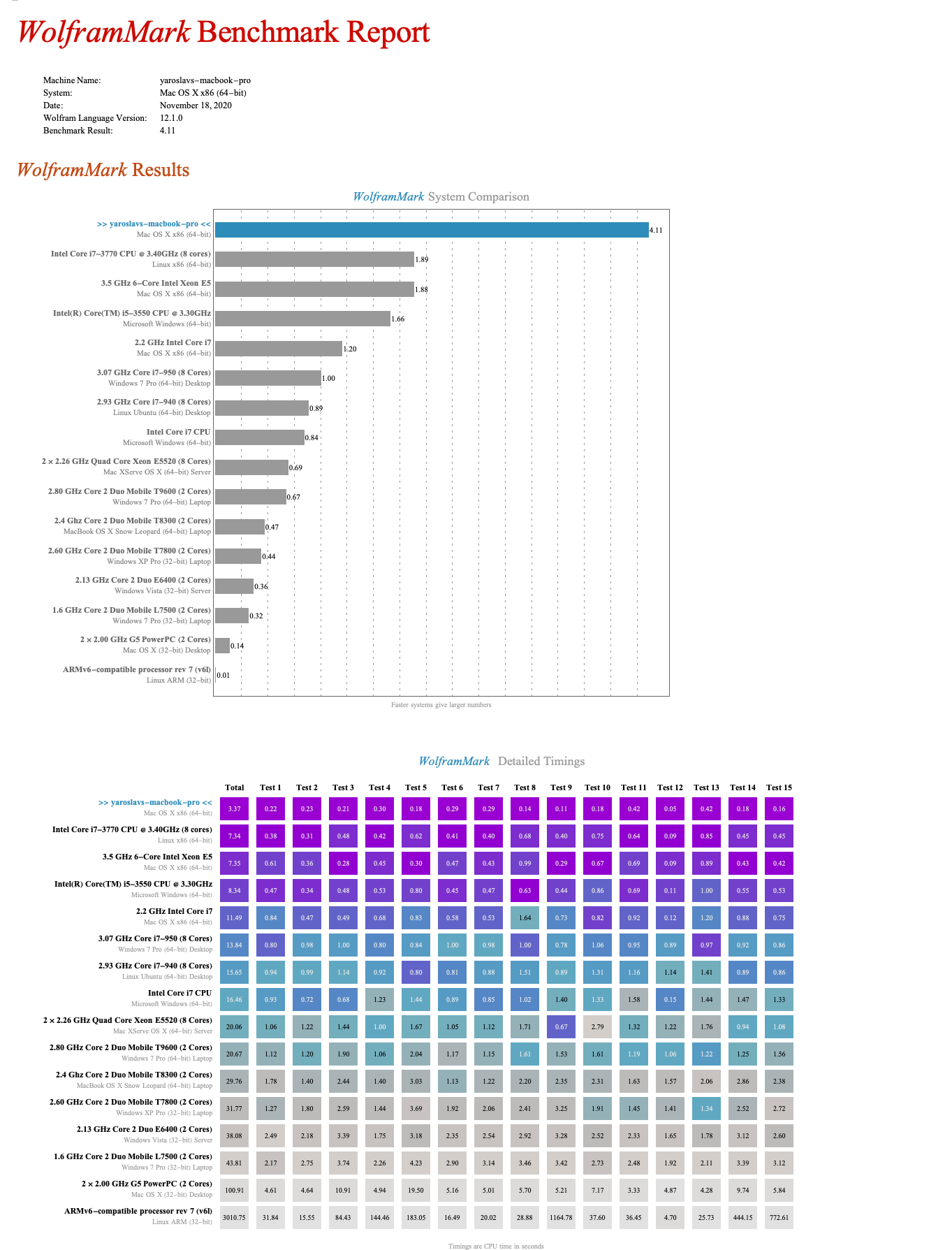
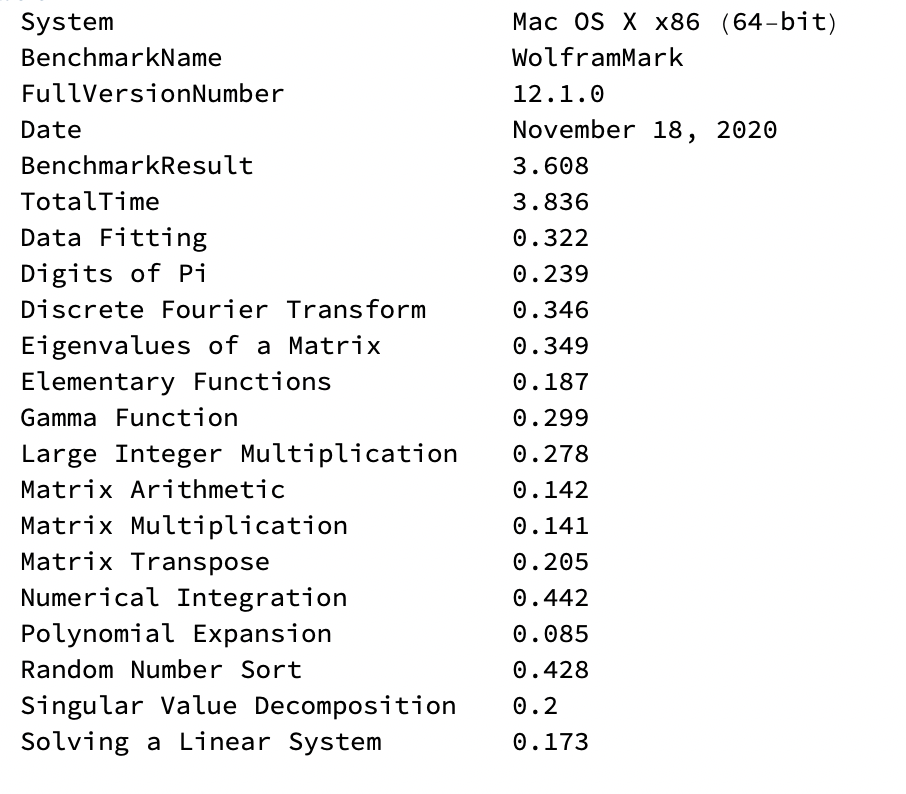
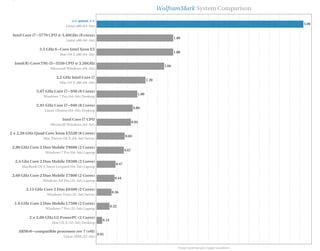
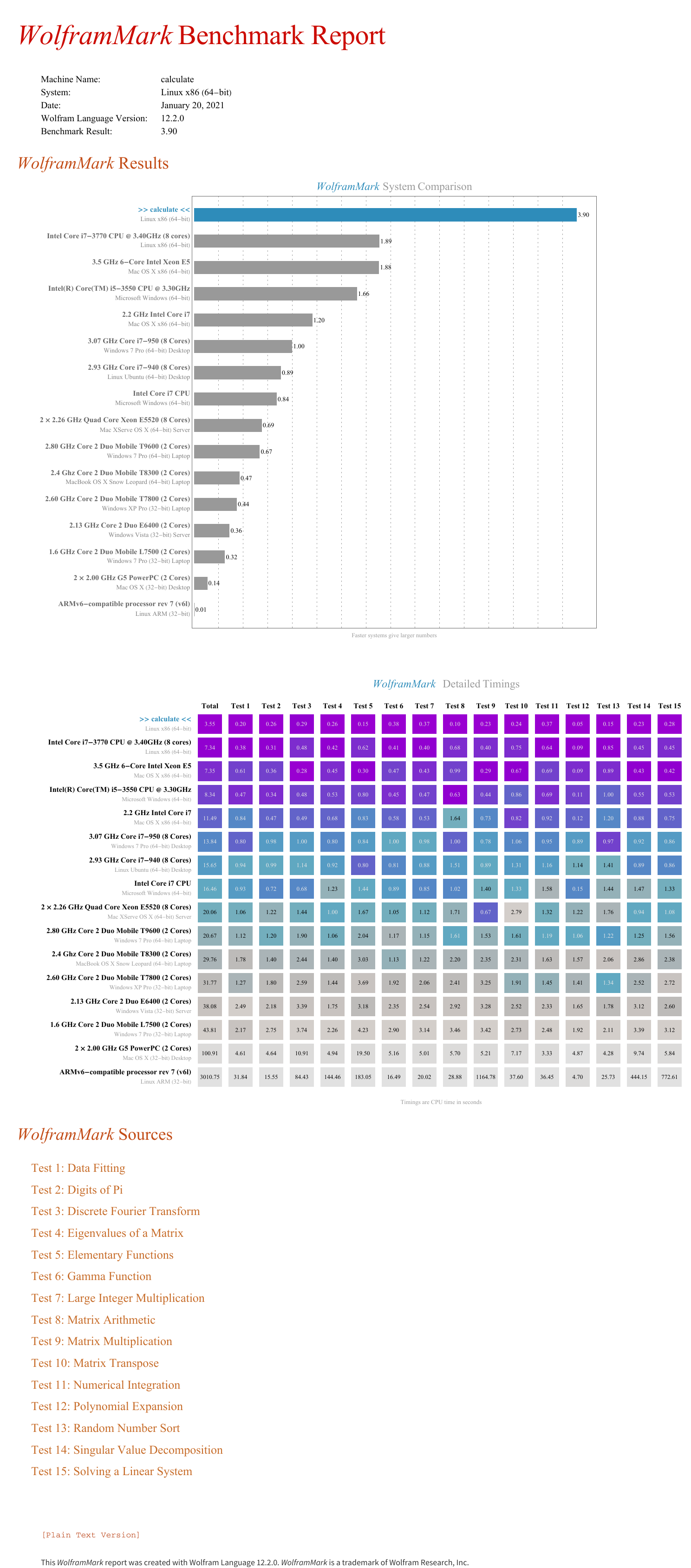
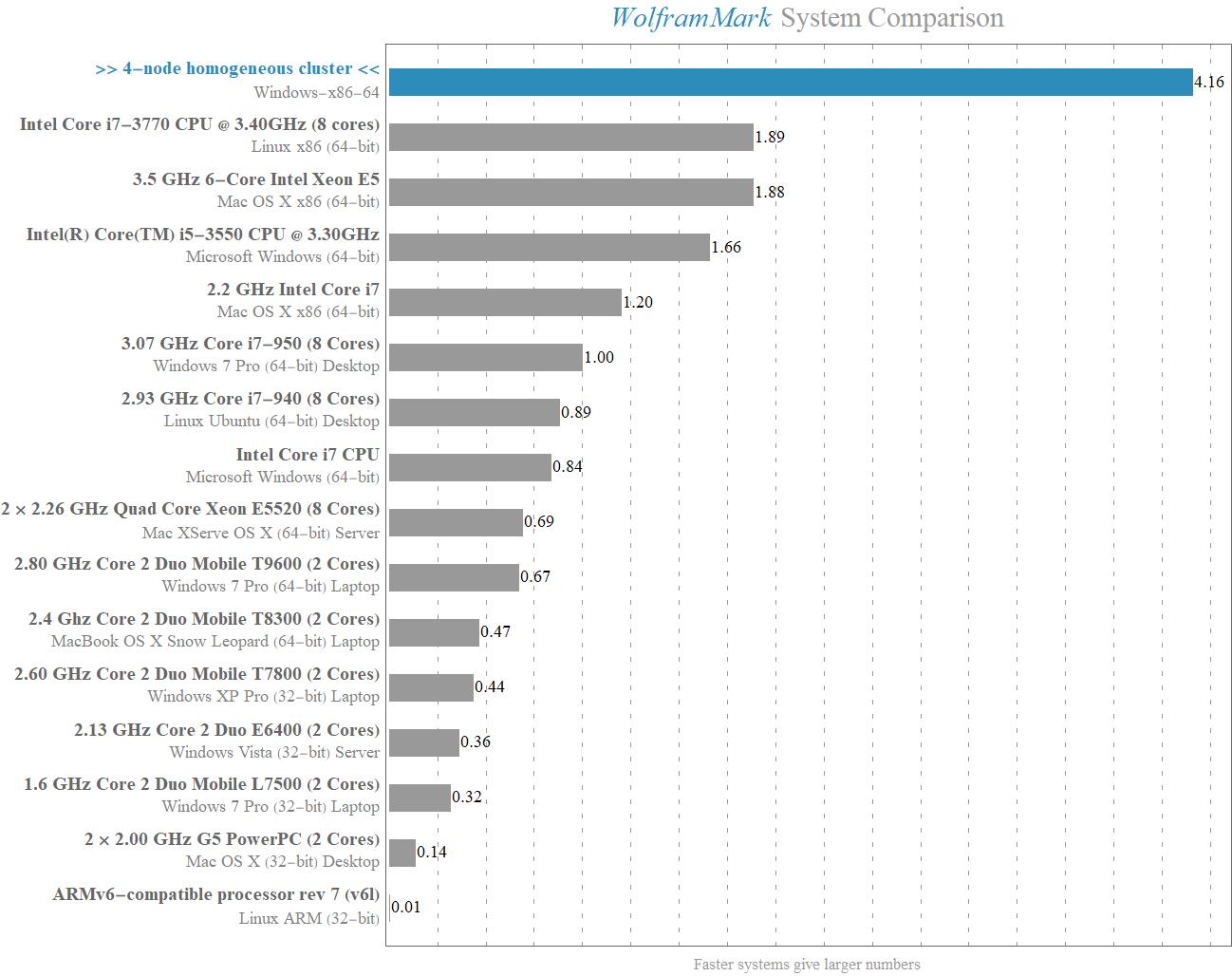
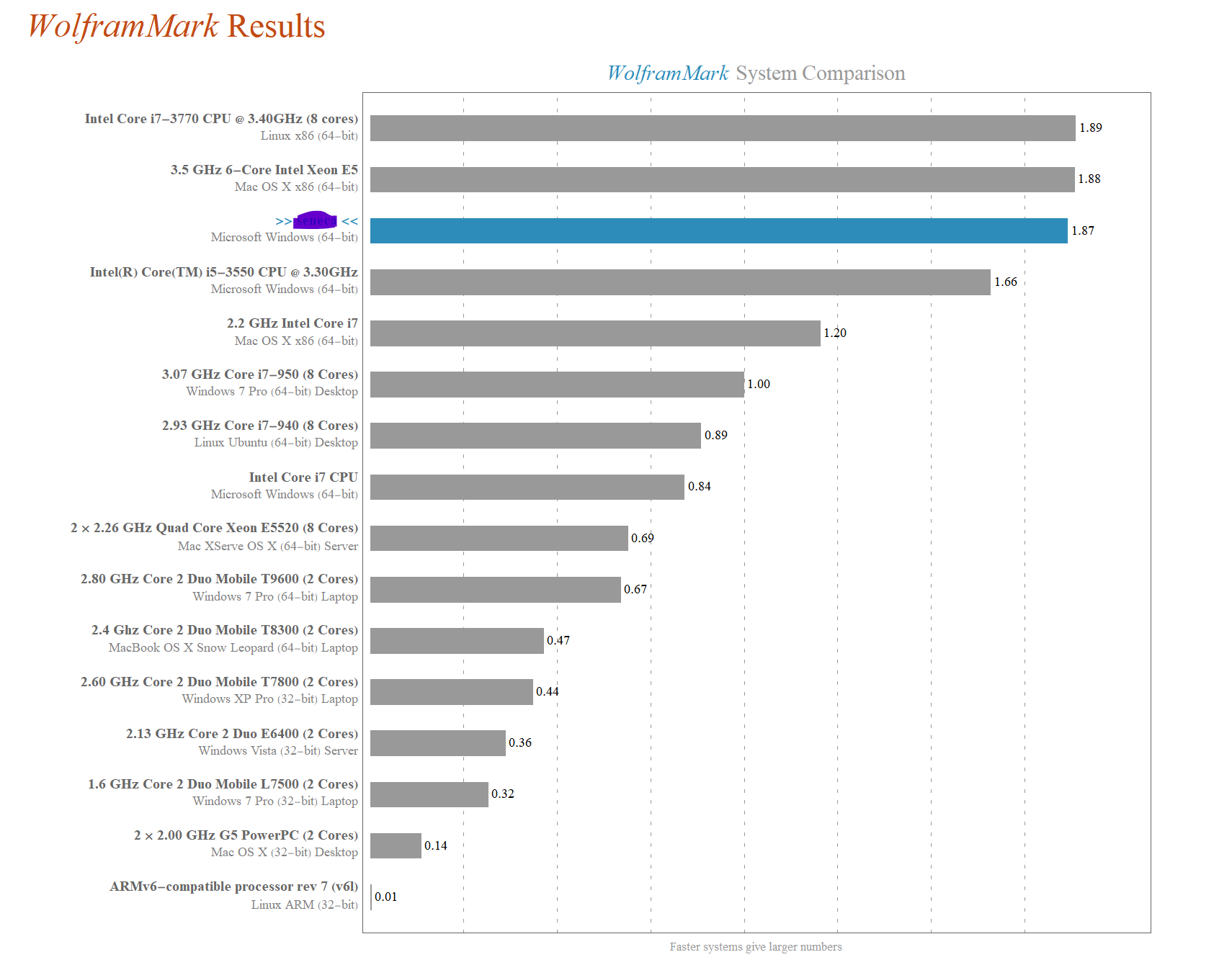
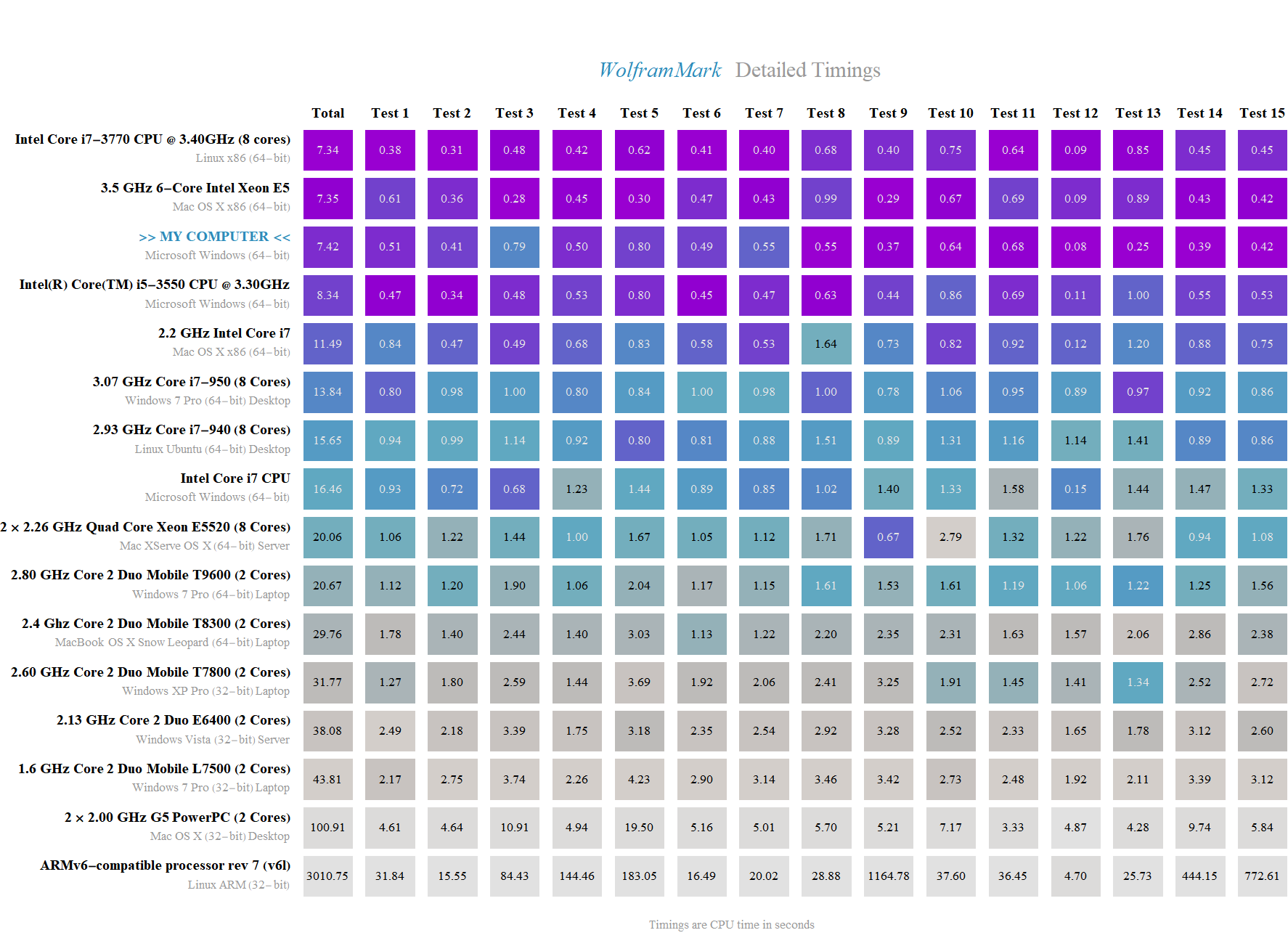
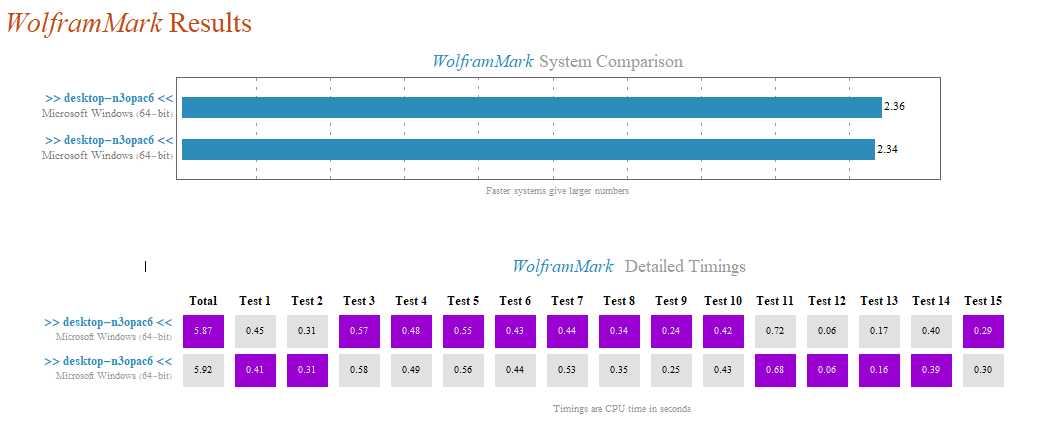
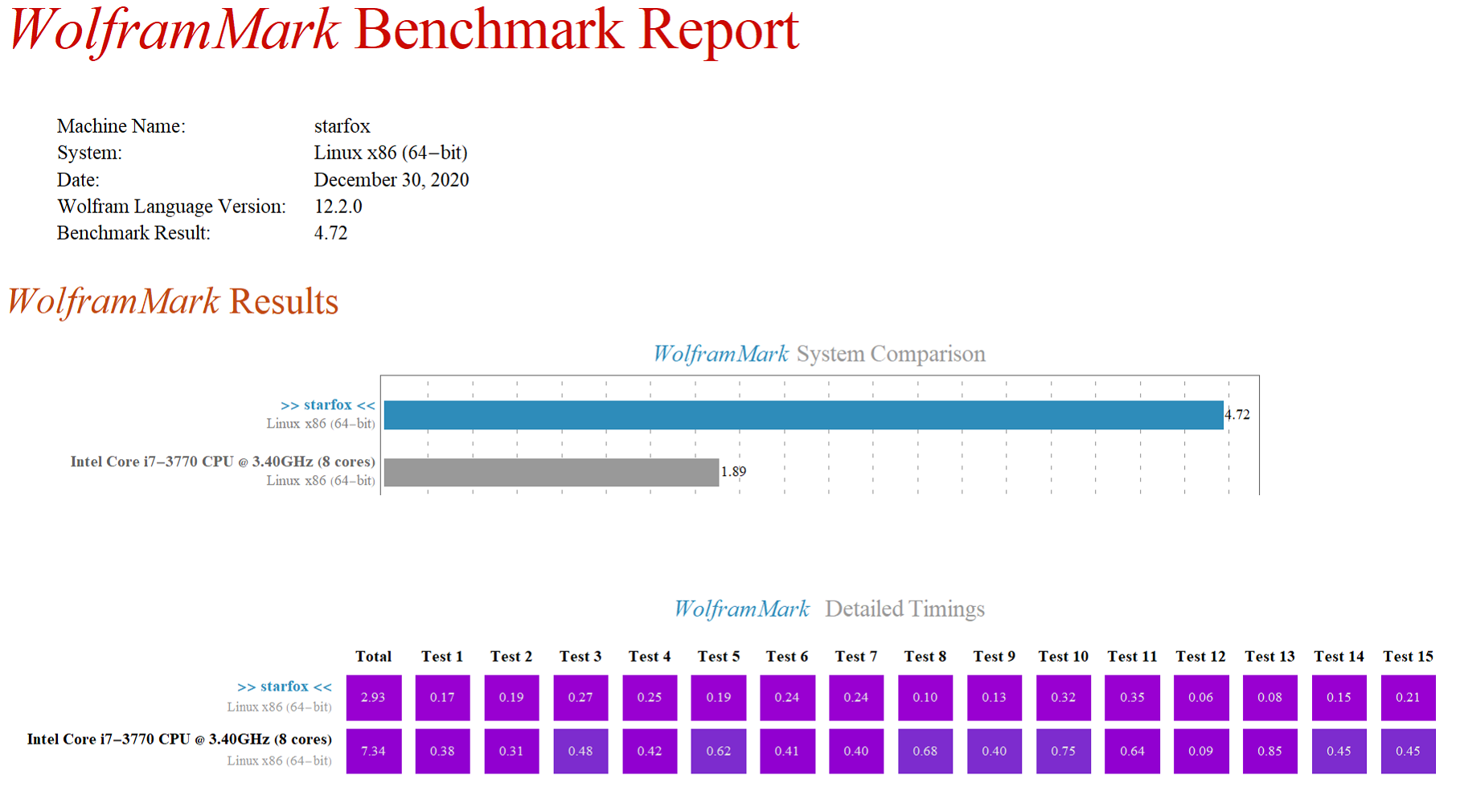
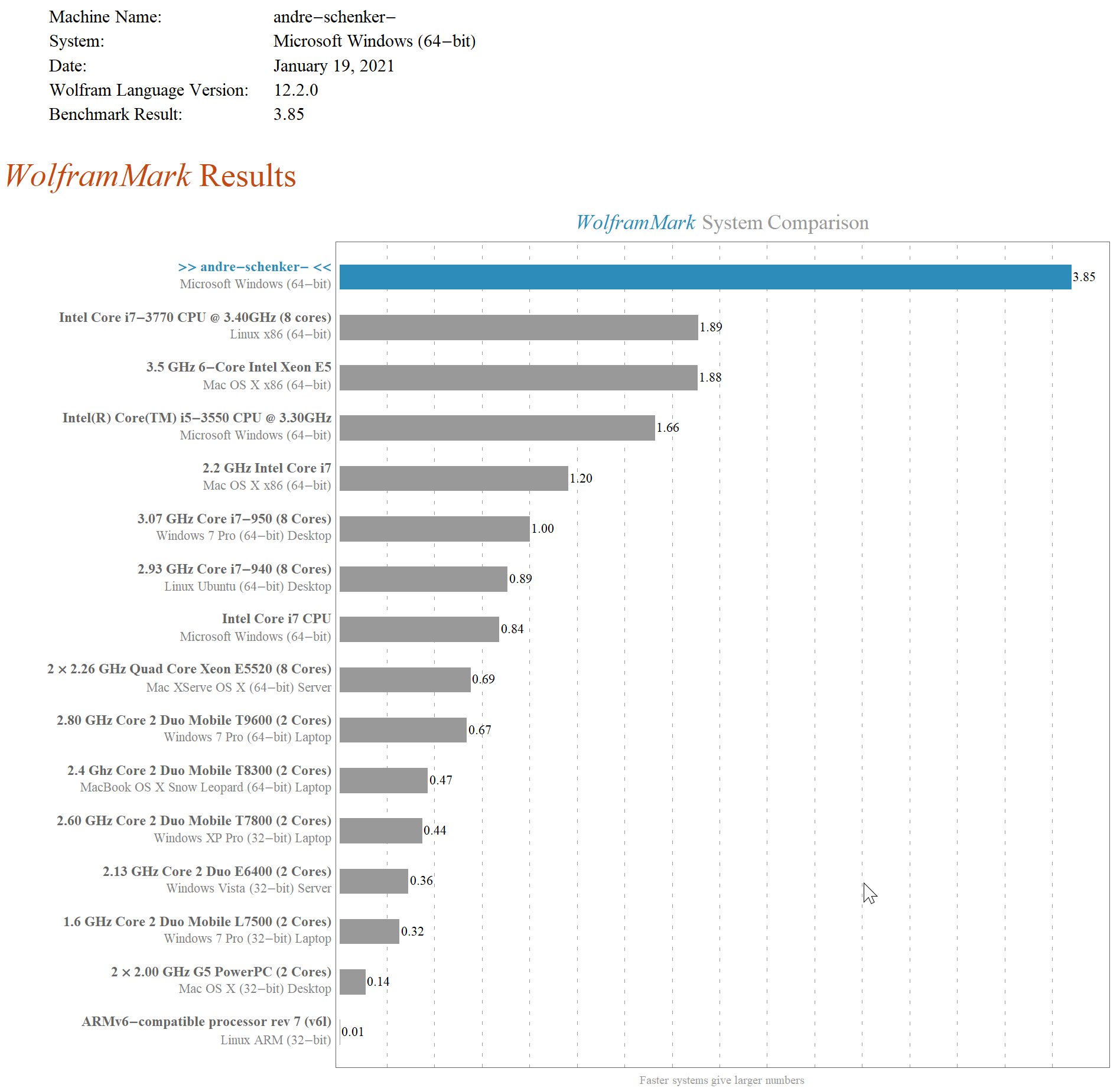


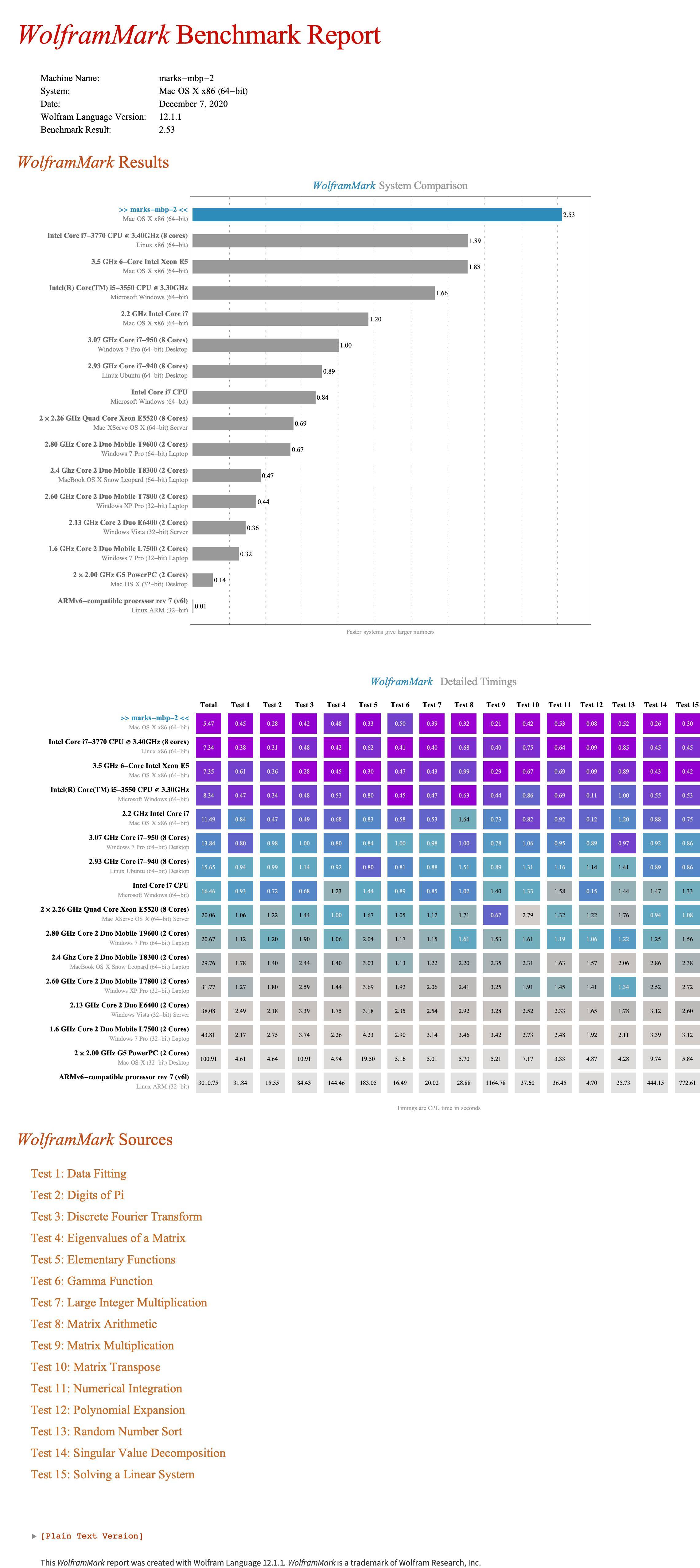



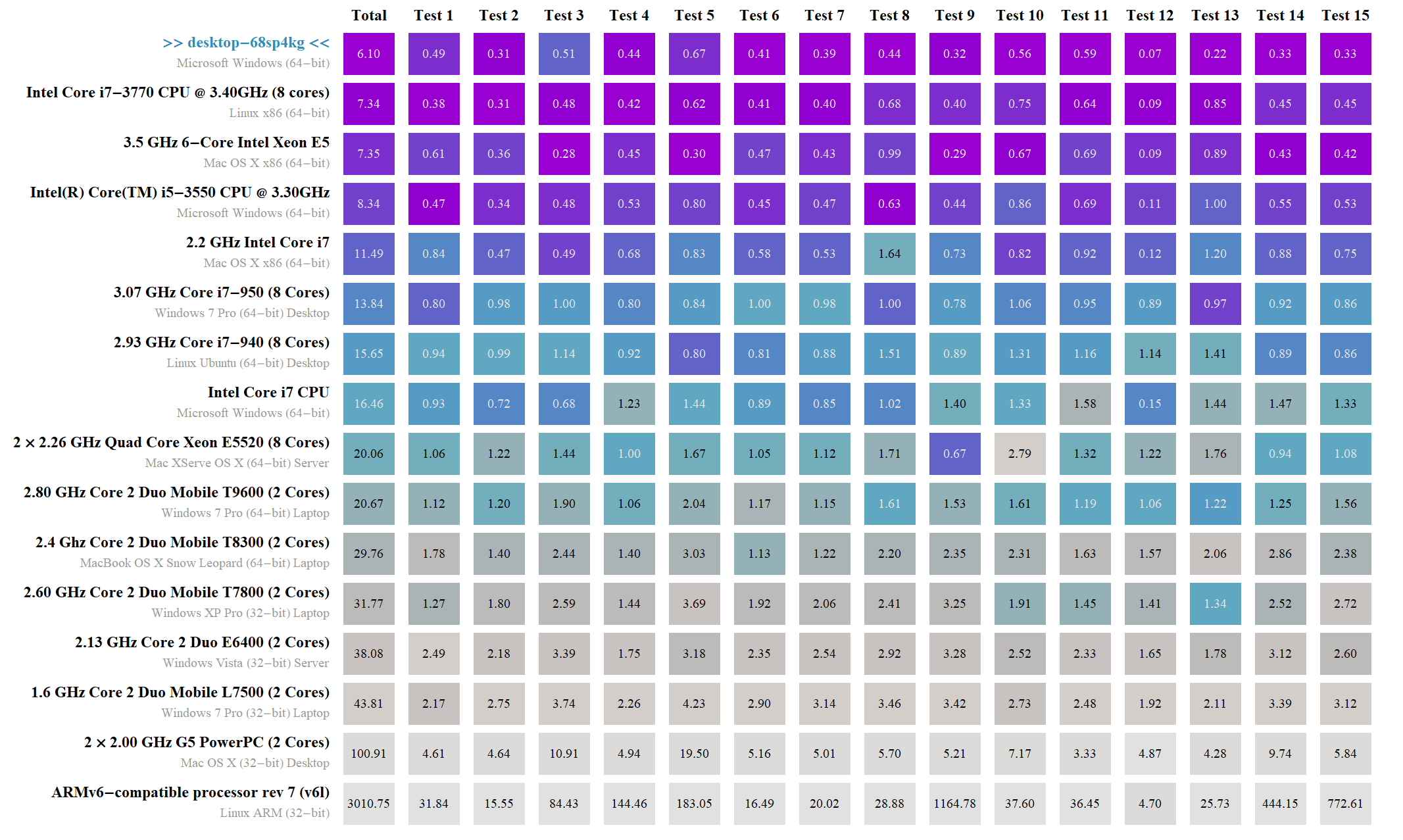
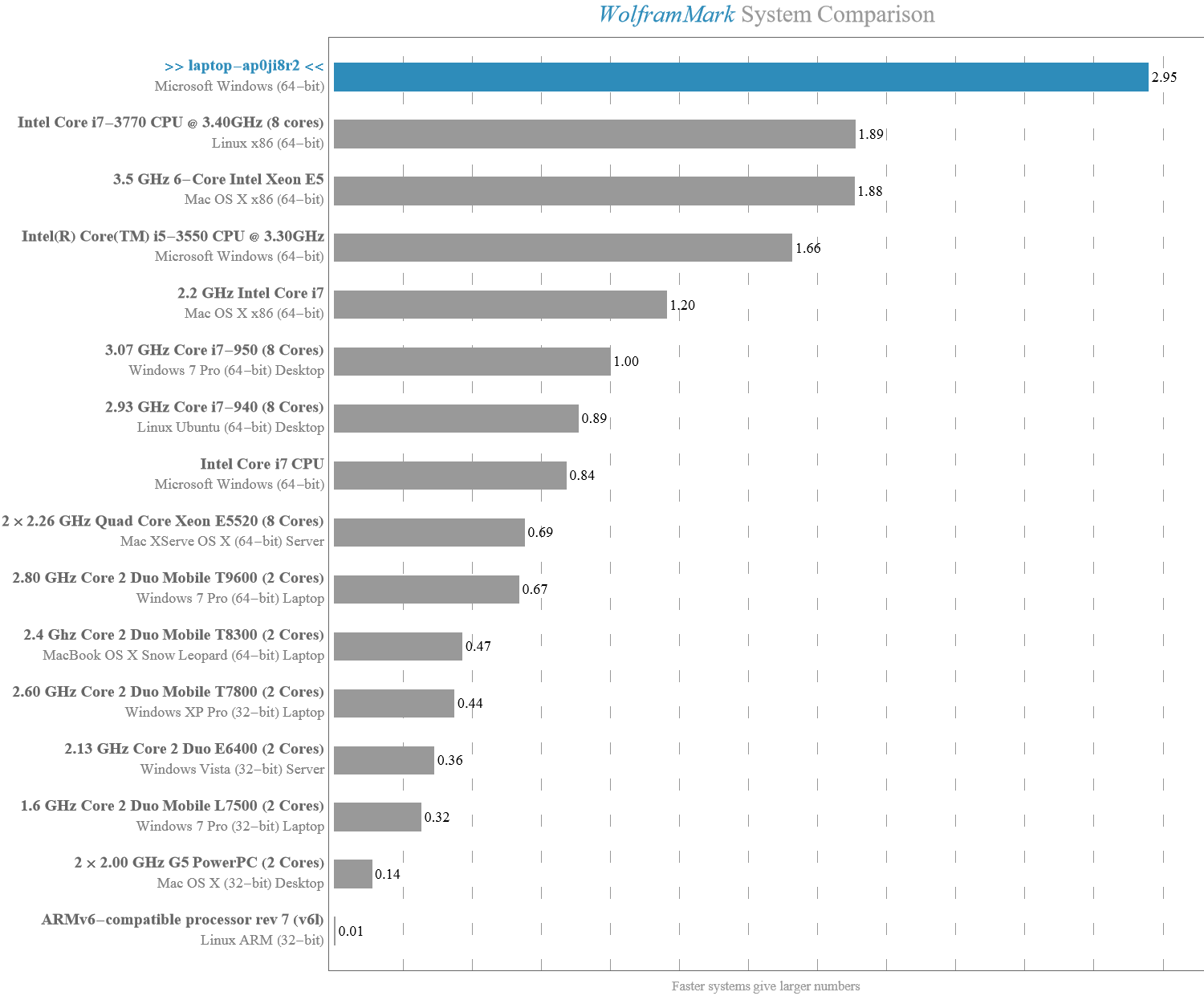
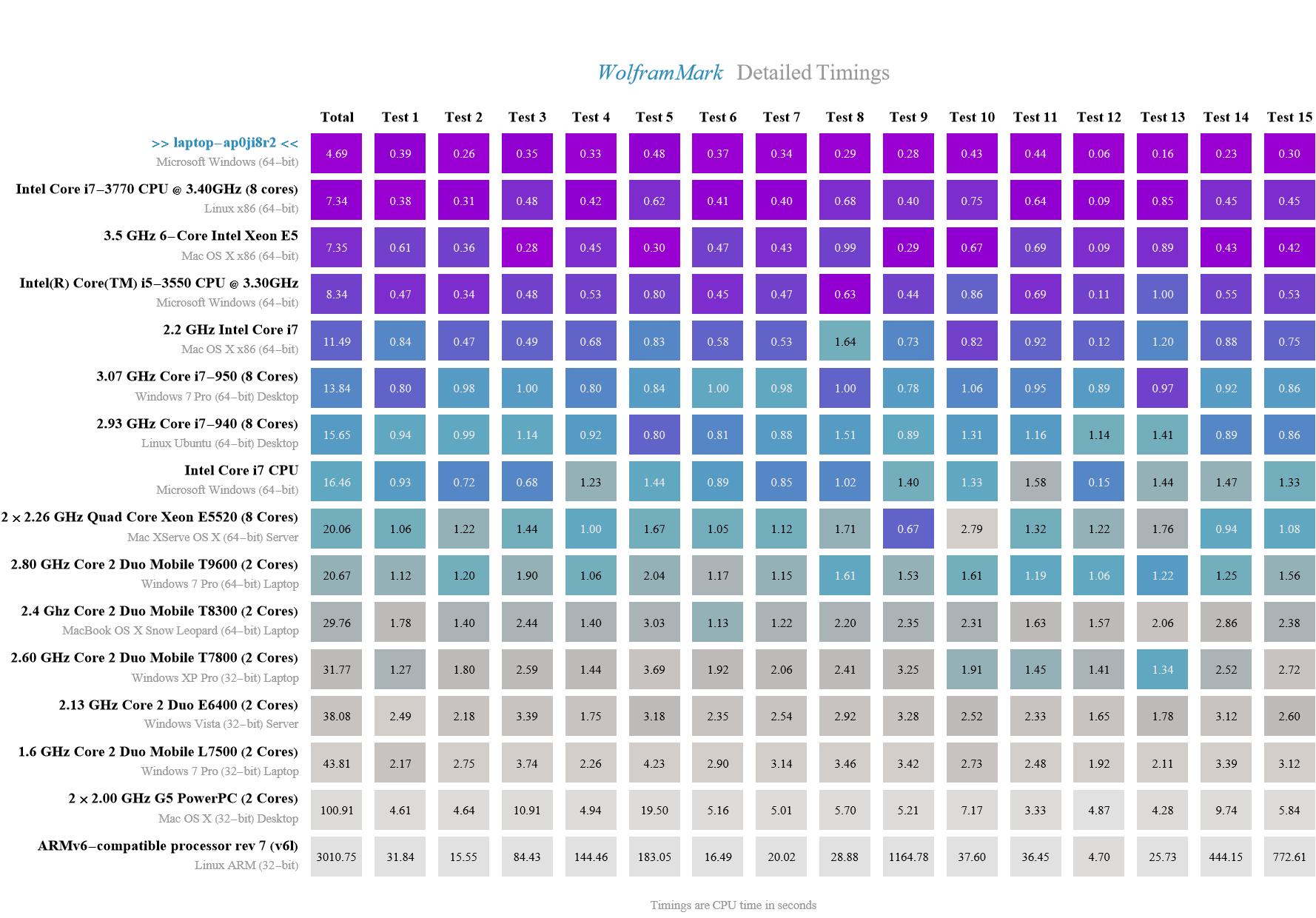
Benchmark[]not just screenshots. $\endgroup$